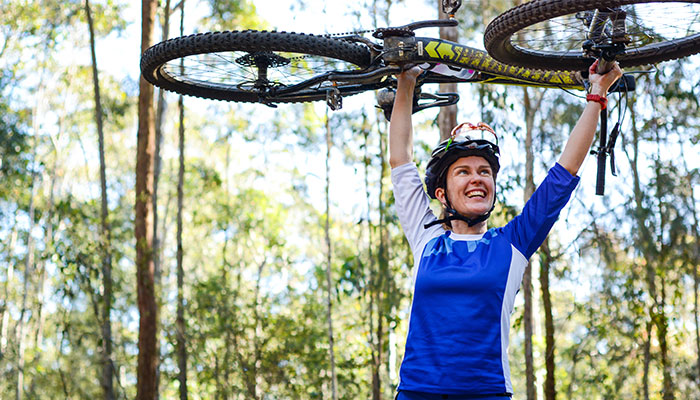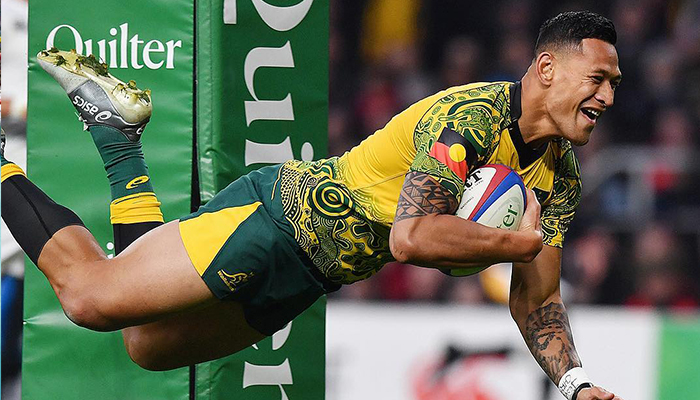Everyone loves a good sports comeback story – especially in the lead-up to the Olympic Games, where just some of Australia’s memorable comeback athletes include swimmer Kieren Perkins, cyclist Anna Meares and hurdler-then-bobsledder Jana Pittman.

Dr Kath Bicknell is a postdoctoral researcher in the Department of Cognitive Science at Macquarie University and an associate member of the Centre for Elite Performance, Expertise and Training. She says there is a science behind successful comebacks, and it involves a mix of cognitive psychology, physical training and attitude.
“High-performance athletes tap into a number of different capabilities, and their physiological capacity is only part of the picture,” says Bicknell.
She says that experts returning to a sport often still perform at a very high level even without having optimal fitness and physical strength, because they have developed their mental processes in ways to help them excel in competition.
We can learn a lot from what they think and how they adapt and how they problem-solve during a race.
She cites the example of Australian BMX champion Caroline Buchanan, who spent nearly two years recovering from a horrific off-road accident in 2017 that collapsed both her lungs, punctured her heart wall and broke her sternum.
The eight-time BMX and Mountain Bike world champion endured nine surgeries and three sternum reconstructions, and was only cleared to start riding a BMX again in September 2019.
Buchanan is already back competing in BMX World Cup events. “She’s coming back to competition now with the renewed mindset that comes from going through such a traumatic event, and aiming for her third Olympics,” says Bicknell.
Dr Bicknell’s research explores the way that our bodies and minds work together in skilled performance, sometimes using her own experience as a competitive mountain bike racer as part of the research process.
“I’ve used case studies from cycling and circus arts to investigate the unique ways people perform complex actions in high pressure, time-critical scenarios, like riding down a rock garden for the first time on a new mountain bike, or learning a trick at height on the trapeze,” she says.
Fast thinking isn’t automatic
Contrary to popular belief that athletic skills become ‘automated’ or non-cognitive, Bicknell says that both cognitive and automatic processes are used by top athletes in peak performance situations – and athletes consciously revise the way they do things.
“It’s all about continually making small adjustments to the way they manage their body and their mind, those ‘one per cent’ improvements that make all the difference.”
These moments are not always ‘mindless’, or 'just happening', she says. “Skilled practitioners think strategically and flexibly to cope with challenges as they arise and increase their chances of success.”
Bicknell says that the psychological activities of high-performance athletes are fascinating and can teach us a lot about the ways that humans can train our brains.
- Don't judge me! Airbnb and the reputation economy
- What relationship will you have with your robo colleagues
Sports that present a multitude of possible scenarios – like mountain biking – give good insights into the interaction of skill and performance.
The sport of mountain biking in Australia doesn’t have a lot of money behind it and isn’t shaped by Olympic selection as much as other sports, she says, but it is highly competitive, and some Australian athletes go on to compete on the world stage.
“There’s so much that can go wrong in mountain biking,” Bicknell says.
“In cross country racing, which might go for an hour and a half, there's also many chances to fix things when they go wrong; the athletes are often really articulate about how they manage those processes,” she says.
“We can learn a lot from what they think and how they adapt and how they problem-solve during a race, and it really debunks that myth of: ‘you just do it, your mind goes blank’.”
Cognitive processes key to top performers
She says that interviews with top mountain biking athletes have revealed a lot about their cognitive processes.
“The more expert people get really good at picking up information and little cues from the performance environment and being able to do really interesting things with that in terms of anticipation, or working out what's going wrong and how to fix it.”
Some riders report that if they think about winning, they slow down to reduce the risk of crashing, and they lose the win as a result.
For mountain bike athletes, this can include reacting to crowd noises around them so they can understand their competitors’ position in the race, and having a finely tuned sense of their speed against the competition clock, Bicknell says.
While injury is the best-known reason for career breaks, athletes can also come back from burnout, or even from taking some time off to boost finances, as many top athletes are under financial pressure.
“Top athletes draw on a lot of preparation, which equips them well to respond very effectively in the moment,” says Bicknell.
Being in the zone
Athletes often talk about being ‘in the zone’ and this equates to a psychology theory about states of flow, where everything comes together for someone physically, they are absorbed in their activity but also hyper-aware and able to react fast to changing situations, she explains.
The concept of ‘flow’ was coined by Hungarian psychologist Mihaly Csikszentmihalyi, and describes a situation where there is a balance between the challenge level of the task and the skill level of the performer, and the person is absorbed in the task, not focused on the result.
“Some riders report that if they think about winning, they slow down to reduce the risk of crashing, and they lose the win as a result,” says Bicknell.
“While some people talk about how they feel like they have all the time in the world, the flow state is one that changes, and in different moments, different things get prioritised,” she says.
“Athletes in mountain biking can be very aware of time, to the point where they're monitoring the time they've got in the duration of the race, the time to the finish, their own sense of pace and how long they can maintain that for.
“They can even monitor the time gaps between themselves and competitors, perhaps by counting the seconds between the crowd noise they hear as they go through a segment of the course, and when the same crowd cheer goes up for the person who is behind them.”
Bicknell says that the top athletes are very good at picking up different sources of information and filtering the most relevant things that will help the task at hand – whether that’s monitoring time and making strategic decisions, monitoring their nutrition or thirst, and even anticipating their own fatigue toward the end of an endurance race and keeping themselves going longer.
“The more experienced athletes are better at managing themselves in the performance environment for the task at hand – and that’s why their comeback is often successful,” she explains.
“They may have to work on their physical strength, but these finely-tuned psychological skills which are built up over years, allow them to be incredibly efficient in how they use and deploy the energy, strength and training time that they have.”
Dr Kath Bicknell is a post-doctoral researcher in the Department of Cognitive Science



